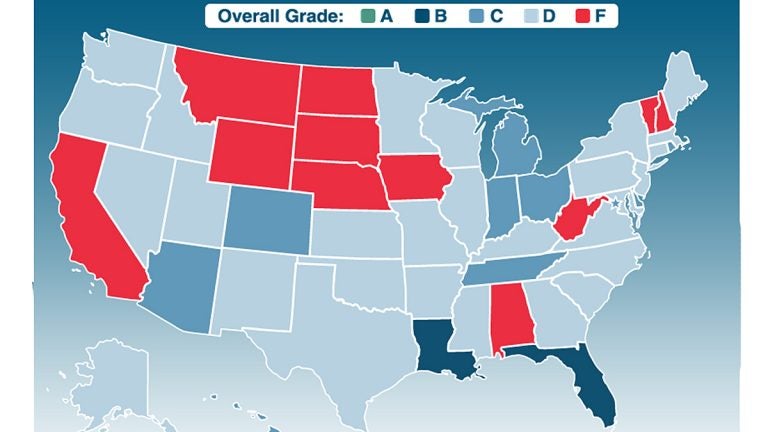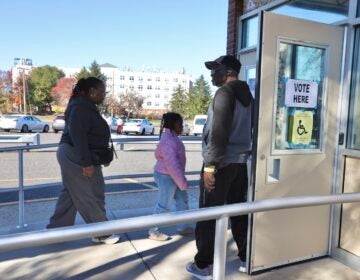New Jersey gets D in StudentsFirst State Report Cards

States colored in light blue received a D in the latest Studentsfirst report card.
This morning StudentsFirst, the take-no-prisoners-education reform organization headed by former D.C. Chancellor of Education Michelle Rhee, released its annual state report cards. New Jersey got a D.
It’s easy enough to dismiss this harsh rating as predictable political grandstanding from radical reformers. Not so fast: school assessments tend to be harsh, whether or not they come from hip start-ups or frumpy warhorses.
Last month, for example, PISA results (Programme in International Student Assessment) judged American schoolchildren’s progress to be “stagnant” compared with other countries. Last week Education Week released its highly-regarded “Quality Counts” state evaluations, framing some sobering results in the context of “powerful fiscal, academic, and social forces that are reshaping traditional school districts. American schools, deemed Ed Week, deserve an average grade of C-. (N.J.’s ratings ran the gamut, from A-‘s in school spending and student achievement, to D’s in policies governing the teacher profession.)
StudentsFirst’s state report cards are more limited in scope. In its introduction to the executive summary it states that the report cards do not try to “assess student achievement, school quality, or teacher performance, but rather the policy environments that affect those outcomes.”
In other words, unlike Ed Week or PISA, the Students First State Report Cards don’t analyze student outcomes as expressed in test scores, graduation rates, or college and career-readiness. Instead, the non-profit focuses on individual state policies that foster meaningful progress towards three education reform goals.
The goals:
Elevate the Teaching Profession
Empower Parents with Data and Choice
Spend Wisely and Govern Well
The goals are divided into 24 objectives and each is then graded on a scale of 0-4. Twelve of the 24 are considered “anchor policies” – those that “represent the strongest lever for reform” – and are given extra weight. After all that calculation, each state is assigned an A-F letter grade “based on how well that state’s policies align with the StudentsFirst policy agenda.”
Five ideas to improve schools
Here are the policy priorities that StudentsFirst recommends for New Jersey (with a little commentary):
1) Eliminate the tired and student-unfriendly policy of laying off teachers in order of seniority, also known as “last in, first out” (LIFO). Currently 11 states retain this anachronistic practice which, say the analysts, “leave[s] effective educators at risk because seniority still trumps classroom performance with respect to compensation and layoff decisions.” In other words, LIFO puts teachers first, not students. NJ School Boards Association’s Executive Director Dr. Lawrence Feinsod recently described this practice as “an impediment to instructional excellence.”
2) Reform N.J.’s charter school laws. (This priority gets rousing approval from NJ Democratic and Republican legislators, charter school advocates, and charter school foes; achieving consensus on a rewrite, however, appears elusive.) The priority here, says StudentsFirst, is achieving funding equity for charter schools and traditional schools, particularly regarding facilities aid. Last year Ed Week noted that charter schools in Newark receive about $16,000 per pupil, almost $10,000 less than Newark’s traditional schools.
3) Don’t lock teachers into a back-loaded compensation system in which they’re forced to stay for a lifetime in order to access a substantial (albeit increasingly unreliable) pension payout. Instead, N.J. should “offer an employer-sponsored defined contribution plan or convert to a cash-balance plan.”
4) Create “an opportunity scholarship program to provide additional options for low-income students.” In other words, pass N.J.’s controversial Opportunity Scholarship Act (OSA), which seeks to provide corporate-sponsored scholarships to private and parochial schools for poor kids in failing school districts.
5) Require schools to notify parents when children are placed in a classroom with a teacher who has been rated “ineffective” through N.J.’s new teacher evaluation laws. Bar schools from placing a child two years in a row with an ineffective teacher.
You may resent the low grades (check out the details yourself) but it’s hard to argue with the agenda. Many of the policy recommendations, except for continued dissension on OSA, are right in line with progressive and bipartisan wisdom on reforming public education. We know this, and continue to wait for our legislators and lobbyists to find the means to convert knowledge into action.
___________________________________________________
Laura Waters is president of the Lawrence Township School Board in Mercer County. She also writes about New Jersey’s public education on her blog NJ Left Behind. Follow her on Twitter @NJLeftbehind.
WHYY is your source for fact-based, in-depth journalism and information. As a nonprofit organization, we rely on financial support from readers like you. Please give today.





